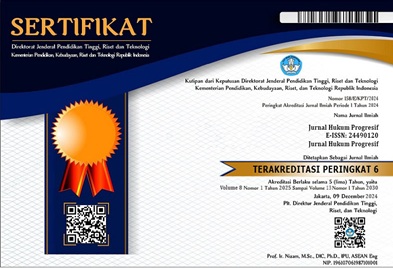PELAKSANAAN SANKSI PIDANA TERHADAP PENGALIHAN OBJEK JAMINAN FIDUSIA TANPA PERSETUJUAN TERTULIS
Kata Kunci:
Jaminan Fidusia, Penegakan Hukum, Sanksi PidanaAbstrak
Konsumen dalam perjanjian pembiayaan konsumen dengan jaminan fidusia dilarang mengalihkan objek jaminan fidusia kepada pihak lain tanpa persetujuan dari penerima fidusia. Penelitian ini membahas permasalahan mengenai apakah sanksi pidana bagi seseorang yang telah mengalihkan objek jaminan fidusia tanpa persetujuan tertulis terlebih dahulu dari penerima fidusia. Penelitian ini menggunakan pendekatan yuridis normatif dan pendekatan yuridis empiris. Pengumpulan data dengan studi lapangan dan studi pustaka. Terjadinya pengalihan objek jaminan fidusia ini, karena masyarakat yang menjaminkan barangnya masih menganggap bahwa barang atau objek jaminan fidusia tersebut masih menjadi hak miliknya. Anggapan tersebut adalah sebuah kekeliruan, dimana meski barang atau objek ada pada pemberi fidusia (debitur) namun barang atau objek tersebut adalah berstatus dipinjamkan oleh penerima fidusia (kreditur). Perlu adanya kesadaran masyarakat yang mengadakan perjanjian pembiayaan konsumen dengan jaminan fidusia agar lebih memperhatikan tanggungjawabnya dalam pemenuhan prestasi, karena tindakan cidera janji tidak selamanya bisa diselesaikan dengan musyawarah. Pelaksanaan sanksi pidana sekiranya dapat memberi efek jera dan menjadi motivasi untuk beritikad baik.
Consumers in consumer financing agreements with fiduciary guarantees are prohibited from transferring the object of fiduciary guarantees to other parties without the consent of the fiduciary recipient. This research discusses the problem of what are the criminal sanctions for someone who has transferred the object of fiduciary guarantee without prior written consent from the fiduciary recipient. The occurrence of the transfer of the object of fiduciary guarantee is because the people who pledge their goods still consider that the goods or object of fiduciary guarantee still belong to them. This assumption is a mistake, where even though the goods or objects are in the control of the fiduciary grantor (debtor), the goods or objects are loaned by the fiduciary recipient (creditor). It is clear that in terms of ownership of documents, as well as proof of legal ownership is held by the fiduciary recipient (Creditor). So that it can reduce the losses that will be suffered by the creditor and it is hoped that there will be awareness of the people who carry out consumer financing agreements with fiduciary guarantees to pay more attention to their responsibilities in fulfilling achievements, because acts of breaking promises cannot always be resolved by deliberation. The application of prison sanctions should be able to provide a deterrent effect and motivate to be in good faith.





